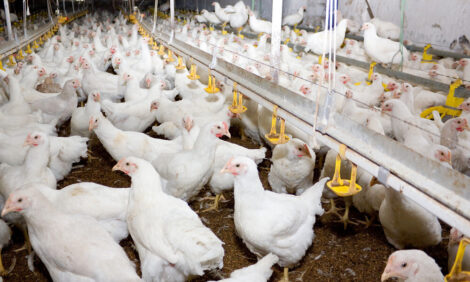



Houseflies can spread bird flu virus: Study
INDIA - Recent North American research has made the startling conclusion that several insects, particularly Musca domestica or the common housefly, are capable of carrying and transmitting Newcaslte Disease Virus and the highly pathogenic avian flu strain, H5N1, which is transmittable from animals to humans, writes Asit Jolly, Asian Age.
British scientist, Terry Mabbett, reporting in a recent issue of Poultry International, says the new research findings must come as a big wake up call for the world's poultry industry.
"That the avian influenza (AI) virus can be spread by winged insects as well as wild birds underlines the need for efficient fly control on poultry farms along with other strict biosecurity measures," he says.
According to Mabbett, studies recently carried out at the North Carolina State University, adult houseflies were seen to carry infectious doses of the Newcaslte Disease Virus in their guts for up to three hours after feeding. This he says, "might be important for the spread of the virus when fly populations are high and in contact with highly virulent NDV strains." The scientist has also cited earlier reported instances of houseflies carrying avian influenza virus. A 1985 study based on a serious 1983/84 outbreak of H5N2 in Lancaster County Pennsylvania (USA) where nearly 90 per cent of the affected poultry stocks died.
More than a third of the housefly samples collected from the vicinity of the outbreak contained bird flu virus particles.
Similarly, blow flies caught near a Kyoto poultry farm in Western Japan following an H5N1 outbreak in 2004 also carried doses of the virus. Dr Mabbett says the presence of avian influenza virus in Musca domestica or other flies has opened up a whole new dimension on this virus disease.
Indian poultry experts told Asian Age that "at the very minimum, poultry farm owners need to put their house in order. Our poultry farms could be particularly susceptible to insect-borne transmissions of the virus because of the abysmal sanitation maintained."
A senior, Punjab-based veterinarian, who has requested anonymity because he does not wish to jeopardise his business relationship with local poultry owners, said, "These people must realise that if flies can be carriers, none of the temporary precautions deployed during suspected disease outbreaks would work. Poultry workers would invariably become the first and most susceptible targets of the infection."
He said, "The only way transmission of the bird flu virus through houseflies can be prevented would be to ensure complete sanitation on our poultry farms. Both the owners and the health authorities must wake up to this unshakeable fact. They must clean up!"
"That the avian influenza (AI) virus can be spread by winged insects as well as wild birds underlines the need for efficient fly control on poultry farms along with other strict biosecurity measures," he says.
According to Mabbett, studies recently carried out at the North Carolina State University, adult houseflies were seen to carry infectious doses of the Newcaslte Disease Virus in their guts for up to three hours after feeding. This he says, "might be important for the spread of the virus when fly populations are high and in contact with highly virulent NDV strains." The scientist has also cited earlier reported instances of houseflies carrying avian influenza virus. A 1985 study based on a serious 1983/84 outbreak of H5N2 in Lancaster County Pennsylvania (USA) where nearly 90 per cent of the affected poultry stocks died.
More than a third of the housefly samples collected from the vicinity of the outbreak contained bird flu virus particles.
Similarly, blow flies caught near a Kyoto poultry farm in Western Japan following an H5N1 outbreak in 2004 also carried doses of the virus. Dr Mabbett says the presence of avian influenza virus in Musca domestica or other flies has opened up a whole new dimension on this virus disease.
Indian poultry experts told Asian Age that "at the very minimum, poultry farm owners need to put their house in order. Our poultry farms could be particularly susceptible to insect-borne transmissions of the virus because of the abysmal sanitation maintained."
A senior, Punjab-based veterinarian, who has requested anonymity because he does not wish to jeopardise his business relationship with local poultry owners, said, "These people must realise that if flies can be carriers, none of the temporary precautions deployed during suspected disease outbreaks would work. Poultry workers would invariably become the first and most susceptible targets of the infection."
He said, "The only way transmission of the bird flu virus through houseflies can be prevented would be to ensure complete sanitation on our poultry farms. Both the owners and the health authorities must wake up to this unshakeable fact. They must clean up!"








